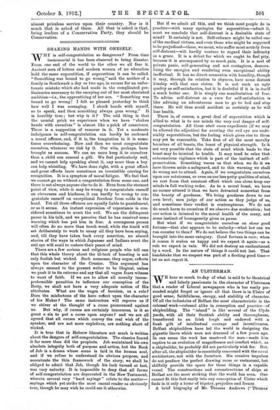THE POLICY OF PATIENCE.
WE publish this week a letter from a correspondent strongly condemning the impatience which is the characteristic of most modern politicians. Whether he is quite accurate in dating the beginning of this period of impatience from the passing of the Elementary Education Act of 1870 is somewhat doubtfuL Most people would be inclined to say that the impatience of politicians has a much earlier origin, and is, in effect, merely the misapplication of a natural human impulse. It is natural for the normal healthy man to wish to be doing something, and as long as be is doing something on his own account, subject to the common law of the land which restrains him from injuring his neighbours, no complaint can he made. The whole trouble arises when this restless energy of the normal human being is directed towards compelling other people to do something which very often they do not wish to do at all. In current phraseology, this form of activity is described by politicians as " a constructive policy." That Liberals and Socialists should have a constructive policy is quite intelligible, for the adherents of these two parties believe that they have a mission in life to reform the world. Being politicians, they are not content to carry on this mission by setting a personal example, or by peace- fully persuading—in the etymological and not in the legal senee—their neighbours to improve their own manner of life. Their conception of their duty is to get control of the power of the State, and then to use that power to force people to adopt reforms which may be good enough in themselves, but which would not voluntarily be adopted. So far do members of the present Liberal Party carry this theory that several of their spokesmen have not been ashamed to declare that they object to the Referendum, because it would prevent the passage of reforms which a party majority might otherwise succeed in imposing upon the nation. That such a doctrine is a denial of the whole theory of democracy does not appear to these ardent poli- ticians to be a matter of any consequence. In their view, the will of the people is evidently nothing more than a phrase, to be used when convenient, but of no political weight in comparison with the supreme end of reforming the world according to the gospel of the Liberal or Socialist Party, as the case may be. But this has never been the view of the Conservative Party, at any rate until recent years. Conservatives, as their very name implies, wish to preserve institutions as they are, or, at any rate, only to make such changes as are demonstrably demanded by the changing conditions of social life. In a word, their conception is to follow society, not to lead it. Of late years, howeven. a new: spirit has taken possession of a large section of what was once the Conservative Party, with the result that many of the most active members of that party are now as keen as any Radical on the formulation of a constructive policy. Even from their own point of view, this policy is both futile and fatal. It is futile, because whatever bids Tory democrats may make for the votes of the discontented_ classes, they would be outbidden by Radicals and Socialists. It is fatal; because the contented classes will not give any enthusiastic support to a party which appears bent on ignoring their wishes. We have purposely drawn the dis- tinction between the contented and the discontented classes rather than between rich and poor, or upper and lower, whatever those words may mean, because it is notorious that in every social stratum there are individuals who are contented with their lot and others who are habitually discontented. Broadly speaking, it is to the discontented that the Radical appeals, to the contented that the Conservative ought to make his appeal. The Conservative who fails to recognize this fails to see the only justification for his own party, and in so failing he is not only injuring his party, but he is injuring his country. For though at times the country as a whole may be said to be rest- less and eager to accept change when offered by ardent politicians, yet, in the main, the people of this country, as of all countries, want to be let alone to pursue their own course in their own way. They do not want to be guided by politicians, necessarily ignorant of the details of the millions of different lives that have to be led, and necessarily more concerned with their own political manoeuvres than the practical needs of the persons whom they would coerce through the power of the State. Therefore a party which is perpetually wanting to do something acts as a constant blister—to use Lord Rosebery's phrase—upon the nation. Possibly blisters are sometimes good for us, but they are always unpleasant, and it cannot always be good to be blistered. Nor is them, in the long run, any reason to believe that the collec- tivity which we call the State will act as a better guide to the mass of individuals than they can act to them- selves. Some positive things, of course, the State must do— such as providing for national defence, to take the most obvious case—but, broadly speaking, the State is on safer ground when it confines itself to protecting individuals from mutual injury. A governing body can more easily see what people ought not to do than what they ought to do, and for that reason the ideal of the State should be to leave the individual to guide himself, subject to certain instructions as to directions in which he is not to go. This is not anew doctrine. If our impatient Tory democrats will trouble to examine the Decalogue they will discover that 80 per cent. of its commandments are negative; and Moses the Lawgiver is not a bad guide for other legislators to follow.
If we compare for a moment the troubles of the community to the diseases of an individual, we can realize how much mischief may be done by the impatience which character- izes the modern politician. Physicians have already found this out, and the wisest physicians now constantly recom- mend a rest cure where their predecessors would have urged some drastic remedy. Even more is it true that ,in the body politic patience will often work Marvellous :cures, whereas, if the politician is allowed to have his way and insists on trying nostrum after nostrum, the general result is that each generation of politicians has to undo the mistakes of the generation that went before.
Nor is it true that the adoption of the policy of patience by the Conservative Party—and, as we hope, by the next House of Commons—in the least degree implies national stagnation. On the contrary, the definite resolve of Parlia- ment to let the *country alone for ten or a dozen years would certainly contribute more to national progress than any conceivable piece of legislation that Mr. Lloyd George and Mr. Ramsay MacDonald in combination could devise. For the real work of the nation is not done by Parliaments but by men of science, by great industrial leaders, by manual labourers—each working in his own sphere, each, in the main, working for his own profit, but all uncon- sciously co-ordinating their efforts for the general advance- ment of the community. The most the State can do to help their work is to smooth obstacles from their-path here and there, so as to facilitate the rapidity of their progress, while preventing them from clashing with one another.. But in practice this is not what the State does. What it does is to attempt to carve out separate lines of advance of its own devising, which, in practice, inevitably clash with the lines of advance thought out by the men who know the work that has to be done. The result is friction and retardation. If the present leaders of the Conserva- tive Party in this country could be persuaded to realize these essential facts of Statecraft they :would reap a magnificent reward for the party, they lead, and confer an.
almost priceless service upon their country. Nor is it much that is asked of them. All that is asked is that, being leaders of a Conservative Party, they should be Conservative.



































































 Previous page
Previous page